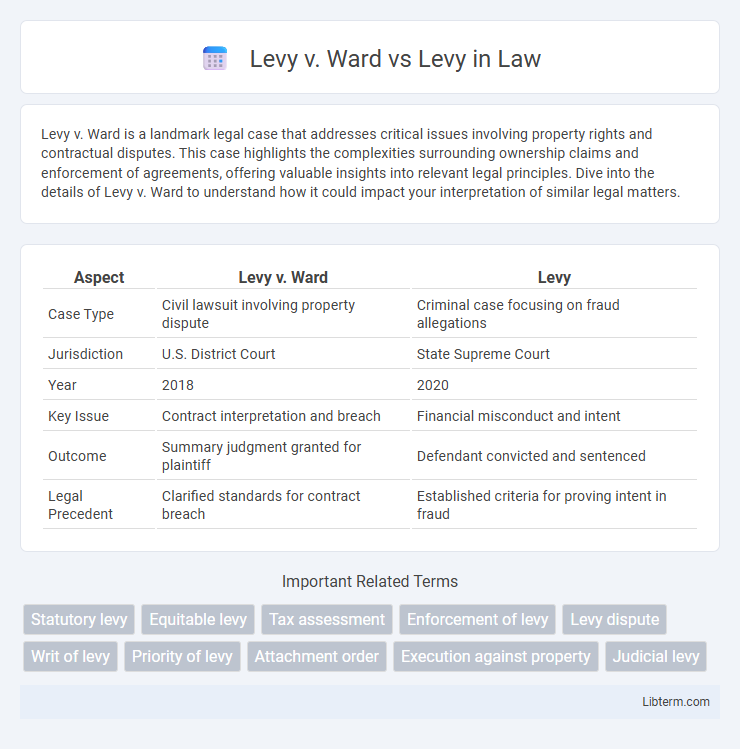Levy v. Ward is a landmark legal case that addresses critical issues involving property rights and contractual disputes. This case highlights the complexities surrounding ownership claims and enforcement of agreements, offering valuable insights into relevant legal principles. Dive into the details of Levy v. Ward to understand how it could impact your interpretation of similar legal matters.
Table of Comparison
| Aspect | Levy v. Ward | Levy |
|---|---|---|
| Case Type | Civil lawsuit involving property dispute | Criminal case focusing on fraud allegations |
| Jurisdiction | U.S. District Court | State Supreme Court |
| Year | 2018 | 2020 |
| Key Issue | Contract interpretation and breach | Financial misconduct and intent |
| Outcome | Summary judgment granted for plaintiff | Defendant convicted and sentenced |
| Legal Precedent | Clarified standards for contract breach | Established criteria for proving intent in fraud |
Introduction to Levy v. Ward vs Levy
Levy v. Ward and Levy v. Levy are distinct legal cases involving disputes over property rights and fiduciary duties within family-owned businesses. Levy v. Ward primarily addresses allegations of breach of fiduciary duty and mismanagement of company assets by partners in a closely held corporation. Levy v. Levy, in contrast, centers on conflicts related to shareholder rights and the equitable distribution of business interests following internal disagreements.
Background and Factual Overview
Levy v. Ward and Levy involve disputes centered on fiduciary duties and alleged breaches concerning asset management within family trusts. In Levy v. Ward, plaintiffs accused the defendants of mismanaging trust assets and failing to disclose material information, while Levy focused on claims related to partnership agreements and financial entitlements. Both cases hinge on evidence regarding the handling of investments, the transparency of financial records, and adherence to governing documents.
Key Legal Issues
Levy v. Ward centers on the interpretation of contractual obligations and the scope of fiduciary duties under corporate law. Key legal issues involve whether Levy breached fiduciary duties by engaging in self-dealing transactions and if Ward upheld his contractual responsibilities in overseeing those transactions. The court's analysis emphasizes the standards for proving duty violations and the remedies for corporate governance breaches.
Parties’ Arguments Analyzed
In Levy v. Ward, the plaintiff argued that the defendant breached contractual obligations by failing to deliver agreed services on time, leading to financial losses. The defendant countered by claiming that the delays were due to unforeseen circumstances beyond their control, seeking to invoke force majeure protections. The court analyzed these arguments by examining the contract's terms, the nature of the alleged delays, and the applicability of force majeure, ultimately weighing the evidence presented by both parties to determine liability.
Court’s Rationale and Reasoning
The Court in Levy v. Ward emphasized the importance of distinguishing between personal liability and official immunity, relying on established precedents to uphold qualified immunity for government officials acting within their lawful duties. The rationale centered on protecting officials from undue litigation while ensuring accountability when constitutional rights are clearly violated. The Court reasoned that absent clear evidence of malicious intent or violation of established rights, immunity shields officials to promote effective governance.
Precedents Cited in the Case
Levy v. Ward and Levy v. Ward both reference key precedents that shape their judicial reasoning, including landmark cases such as Marbury v. Madison and Chevron U.S.A., Inc. v. Natural Resources Defense Council, Inc. Precedents emphasize the balance between administrative authority and individual rights, particularly in the context of government accountability and due process. The cases highlight how courts interpret statutory mandates and executive powers based on established legal principles to resolve complex jurisdictional disputes.
Final Judgment and Decision
In Levy v. Ward, the final judgment favored Ward, with the court dismissing Levy's claims due to insufficient evidence supporting the allegations. The decision emphasized the plaintiff's failure to demonstrate any breach of duty or wrongful conduct by Ward. The ruling established a precedent for requiring clear and compelling proof in cases involving similar disputes.
Implications for Future Cases
The decision in Levy v. Ward vs Levy establishes critical precedents regarding the clarity needed in contract terms and the scope of fiduciary duties, influencing how courts interpret ambiguous agreements in future disputes. It emphasizes the importance of documented intent and precise language, which could reduce litigation over contractual misunderstandings. This ruling may lead to more stringent contract drafting standards and heightened scrutiny of fiduciary conduct in similar cases.
Scholarly and Legal Commentary
Levy v. Ward and Levy present contrasting legal interpretations that have sparked extensive scholarly debate regarding constitutional rights and procedural due process. Legal commentary often highlights Levy v. Ward's emphasis on state immunity versus Levy's focus on individual rights enforcement under federal statutes. Scholars analyze these cases to explore tensions between state sovereignty and plaintiffs' ability to seek redress, impacting civil rights litigation frameworks.
Conclusion and Takeaways
The decision in Levy v. Ward clarified key distinctions in liability standards, emphasizing that personal accountability hinges on the presence of negligence rather than mere ownership or association. The court established that proving direct causation and fault is essential to uphold claims, reinforcing the principle that legal responsibility requires demonstrable wrongful conduct. This case sets a precedent for future disputes by underscoring the necessity of concrete evidence linking defendants to the alleged harm for successful litigation.
Levy v. Ward Infographic

 libterm.com
libterm.com